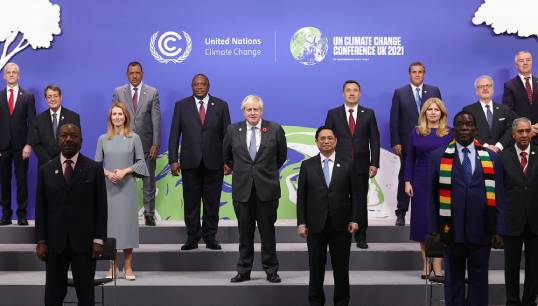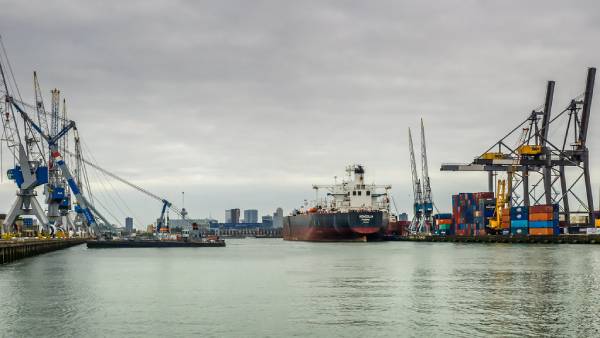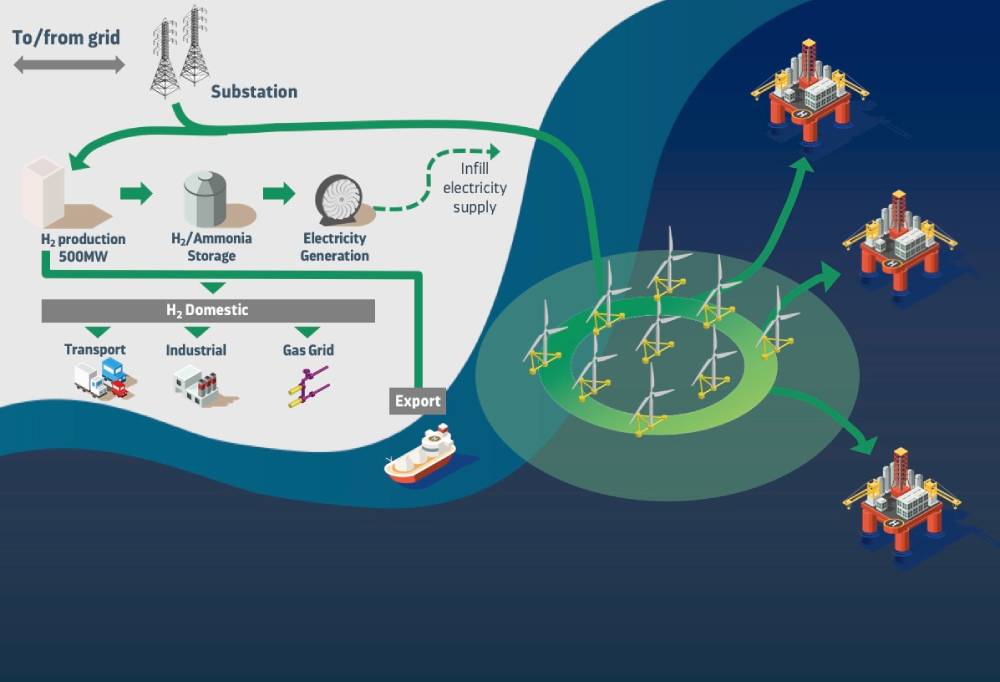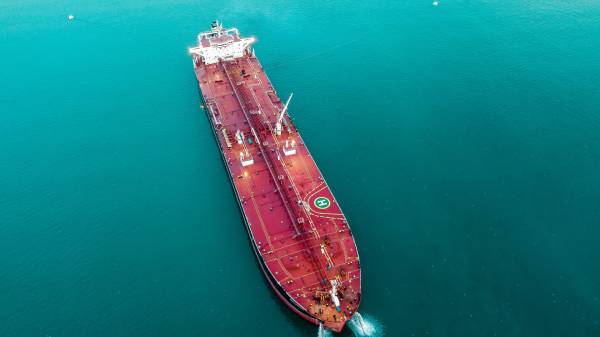- Topics
- Campaigning
- Careers
- Colleges
- Community
- Education and training
- Environment
- Equality
- Federation
- General secretary message
- Government
- Health and safety
- History
- Industrial
- International
- Law
- Members at work
- Nautilus news
- Nautilus partnerships
- Netherlands
- Open days
- Opinion
- Organising
- Podcasts from Nautilus
- Sponsored content
- Switzerland
- Technology
- Ukraine
- United Kingdom
- Welfare

At the global environment summit COP26 in November 2021, campaigner Greta Thunberg was not optimistic that politicians and industry leaders would keep their promises on decarbonisation. So one year on, what's been happening in shipping? Are we going greener, or was it all just 'blah blah blah'? Jon Parkin and Sarah Robinson report
The COP26 climate summit was a very high-profile global event, and all eyes were on the UK, which hosted the summit in the city of Glasgow. In the excitement of the moment, Britain made decarbonisation pledges relating to many different industries but sadly some of these seem to be going by the wayside as the government now looks to increase domestic fossil fuel extraction in response to the fuel insecurity and price hikes caused by the Ukraine war.
However, things are looking better for the UK government's commitment to maritime decarbonisation initiatives – and other countries are also making an effort with these, as we can see below.
Green shipping corridors
The Clydebank Declaration formed the backbone of the commitments at COP26, with 24 signatories committing to create at least six 'green shipping corridors' by the middle of the decade.
Green shipping corridors have been described as specific routes where the economics, logistics and politics of zero-emission shipping are more feasible and rapid deployment can be supported by policy and industry action.
Has any progress been made, though? The short answer is yes, although the UK's involvement with corridors is less impressive than that of other signatories. There are signs that green corridors will be popping up across the world. The deadline is looming, but the target could be met.
The port of Rotterdam is an obvious focal point, with several proposals for green corridors. In July it was confirmed that 'the world's longest green shipping corridor' would be launched between Rotterdam and Singapore. Further partnerships between Gothenburg and Rotterdam, and Gothenburg and Ghent were announced in October 2022.
On top of these, recent developments between Finland and Sweden have led to US$1.6million being put into the creation of a corridor between Turku and Stockholm, a route commonly used by ferry operator Viking Line.

The Port of Rotterdam is becoming a focal point for green shipping corridors – including the world's longest, in partnership with Singapore. Image: Frans Berkelaar/Flickr
Some activity on creating a green corridor between Spain and the UK was reported at a recent conference organised by the green transport campaign group Transport & Environment. At the event – titled Does Spain really want to decarbonise shipping? – the British Embassy in Madrid said there had been a number of discussions and workshops between stakeholders in Spain and the UK, with another set to take place in December of this year, but while these are positive steps, there don't appear to be any concrete plans to move forward with a corridor scheme any time soon.
Green maritime innovation
Back in the UK, the government's Clean Maritime Demonstration Programme (CDMC) is now in its second round and has supported 86 projects with a total of £37 million.
In September 2022 the winners of the first round of the CDMC were announced. These included three feasibility studies into UK green corridors. Mooted corridors include Dover-Calais/Dunkirk, a 'Clean Tyne Shipping Corridor' and Aberdeen-Norway.
The second round of the CDMC is due to be completed in August 2023.
Implementation of cleaner maritime fuels
As the Telegraph has often reported before, ideas for using fuels like hydrogen and ammonia for vessel propulsion have been around for many years now but have mostly been stuck at the pilot stage. These delays are not necessarily a result of shipowners' unwillingness to invest; they can be as much to do with a lack of national and international infrastructure to produce these fuels at scale and make them available for bunkering in ports.
Transport & Environment's Spanish conference had some encouragement on these issues from the likes of Hydrogen Europe and Global Maritime Forum talking about their work to make greener fuels more commercially viable.
MAN energy solutions told the conference it has ammonia-fuelled engines set to come into service in 2024, and the option is now open for shipping companies to easily change their current MAN engines to low-carbon fuels via retrofitting.
However, speakers across the event were keen to stress one thing: more support from the European Parliament would help in the journey towards emissions reduction goals.
Meanwhile, a steady flow of press releases has been coming into the Telegraph inbox in the year since COP26 announcing contracts signed on green maritime infrastructure projects and vessel propulsion systems.
For example, green infrastructure developer Cerulean Winds has signed an agreement with px Group, an operator of large-scale industrial facilities, as it moves to progress its plans for an integrated 200-turbine floating wind and hydrogen development in the North Sea. This development will produce 'green hydrogen' using the renewable energy from the wind turbines.
In Norway, shipowner Havila is fitting a coastal cruiseship to run on hydrogen and shore-charged batteries, with the aim of this entering service in 2023, and another three similar vessels on the way.

The green infrastructure developer Cerulean Winds is progressing plans for an integrated 200-turbine floating wind and hydrogen development in the North Sea. Image: Cerulean Winds
The tech company Ocean Infinity has announced the development of zero-emission, remotely operated and autonomous ready short sea container vessels that will operate in a green corridor between Norway and the Netherlands.
Shoreham Port on the south coast of England says it is collaborating with Local Fuels, Ricardo and H2 Green to explore developing a renewable green energy hub. The aim is for the hub to provide clean fuel for locally based fleets and be a catalyst for the decarbonisation of transport across the region.
These are all encouraging projects, albeit not all close to realisation, but what the upbeat announcements rarely mention is an important issue that was addressed at COP26: the need to upskill the workers who will be using the new fuels and operating the new technology.
A fair green deal for maritime workers
At COP26, the International Transport Workers' Federation (ITF), of which Nautilus is a member, signed up to the new Just Transition Maritime Task Force. Other members of the task force include the International Chamber of Shipping, the International Maritime Organization and the International Labour Organization.
Since its formation, several further partners have been announced, with the Singapore Maritime Foundation becoming the first public partner in April 2022.
The Task Force set out to achieve its aims in two phases, the first being to understand what upskilling is needed to make sure no seafarers are left behind when new technology is introduced.

Ship operators are starting to retrofit their ships' engines to run on greener fuels. Image: Alexander Bobrov/Pexels
At COP27, which is being held in Egypt in November 2022, the Task Force is releasing a report on the findings of phase one. This report covers areas such as diversity and inclusion, support for seafarers' skills and transferability of those skills, and health and safety. It also calls for Skills Councils to be established which will focus on new fuels and technologies required for seafarers, and includes a 10-point action plan with seafarer unions at its heart.
From there, phase two can progress, which aims to ensure decent work at ports, quality green jobs for workers, and positive interaction with communities affected by the transition to green technology.
Nautilus will be paying close attention to the Task Force's findings and proposals as the Union seeks to expand its own lobbying and campaigning for a just transition that supports the livelihoods and aspirations of members. A key part of this will be ensuring that seafarers can connect with 'abstract' environmental concepts and understand how they can future-proof their own careers in response to the changes that are coming, something that the Union will be doing in collaboration with its partners in the Nautilus Federation and beyond.
Tags
More articles
COP27: ITF condemns 'exclusion' of workers
The International Transport Workers' Federation (ITF) has condemned backtracking on commitments to workers at the COP27 climate summit, held in November at Sharm-el-Sheikh, Egypt.
Action plan for a 'just transition' to green shipping launched at COP27
UN organisations, shipowners and trade unions have come together at the COP27 climate summit in Egypt to launch a decarbonization action plan for the global seafaring workforce.
